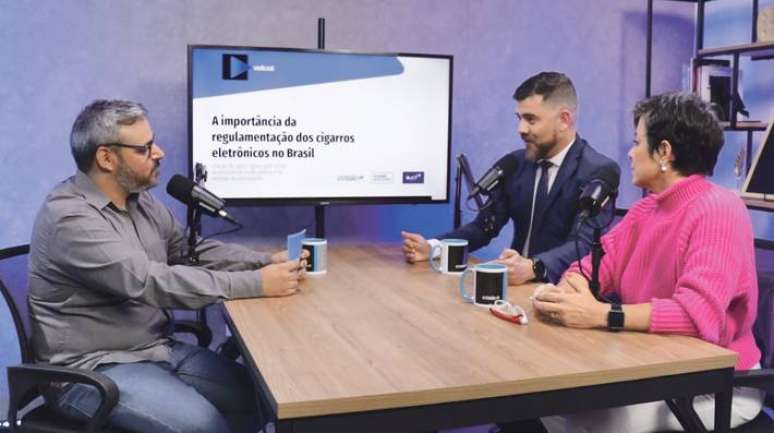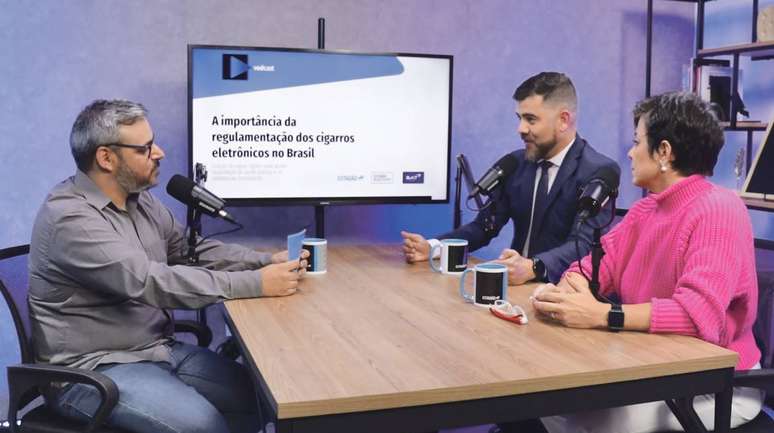Various aspects related to vaping were discussed in a vodcast promoted by Estadão Blue Studio
Earlier this month, the National Health Surveillance Agency (Anvisa) approved the opening of a public consultation proposal on the regulation of e-cigarettes in Brazil. The production, marketing, import and advertising of electronic smoking devices are prohibited in the country by an Anvisa resolution issued in 2009, a time in which there were no sufficient scientific studies to determine the level of safety in the consumption of so-called vaporizers, i.e. vaporizers. Therefore, the agency decided to ban them based on the precautionary principle.
Since then, numerous studies have attested to the reduction in harm to consumers’ health by replacing conventional cigarettes with e-cigarettes, if properly regulated. Countries such as the United States and the 27-nation European Union have already regulated these products on a science-based basis, and some have begun to encourage substitution as a public health policy.
The essential difference between the two types of cigarettes are the nicotine delivery processes: conventional ones do so by burning the tobacco, while in electronic cigarettes there is a process of heating the liquid that contains nicotine, which excludes various other potentially harmful substances for present health. in conventional cigarettes.
Last year, King’s College London published the largest scientific review on the topic, consisting of over 400 studies, the main conclusion of which is that there is a reduction in health risks when comparing vaporizers with conventional cigarettes, a due to the lower degree of exposure to toxic substances. This was the main scientific basis for why, in April this year, the UK Government decided to launch a program to distribute e-cigarette kits to adult smokers, as a harm reduction policy. In total, around 80 countries, such as the United States, Canada, Sweden, Australia and New Zealand, have regulated vape consumption based on scientific evidence.
Right to choose
With the opening of the public consultation in Brazil, civil society will have a period of two months to express their opinion on the topic, discussed in the vodcast “The importance of regulating electronic cigarettes in Brazil”, produced by Estadão Blue Studio with the patronage of BAT Brazil. The conversation was attended by Alessandra Bastos, pharmacist, former director of Anvisa and scientific advisor of BAT Brasil, and Iuri Esteves, head of regulatory and scientific affairs of BAT Brasil.
The podcast participants recalled that, despite the ban in Brazil, the number of e-cigarette users has continued to grow, going from 500,000 to the current 2.2 million adults who regularly consume these devices over the last four years, according to research of the Ipec Institute. With the ban in place nationwide, these people consume 100% contraband products, without any quality control. “It’s an immense health risk, because no one knows what’s inside the liquid sold,” recalls Alessandra Bastos.
He stressed the need to humanize smoking and separate practice from judgments. “What needs to be done is to provide safe options so that people can make their decisions with the least possible impact on their health. This is what regulation of e-cigarettes would provide,” the expert said. With the regulation, strict rules would be created to define who can manufacture the products, which substances can be used, who can distribute and sell the product and who can consume it, all accompanied by numerous information and education campaigns.
Note: Vaporizers and heated tobacco products are intended for ages 18 and older, just like cigarettes. These products are not risk-free.
Reducing the risks of vaporizers and heated tobacco products is based on the latest scientific evidence available and on the condition that traditional cigarette consumption is completely replaced.

Source: Terra
Ben Stock is a lifestyle journalist and author at Gossipify. He writes about topics such as health, wellness, travel, food and home decor. He provides practical advice and inspiration to improve well-being, keeps readers up to date with latest lifestyle news and trends, known for his engaging writing style, in-depth analysis and unique perspectives.








